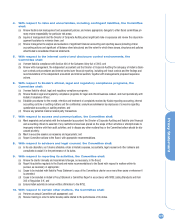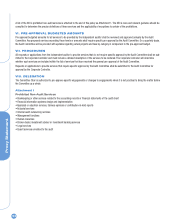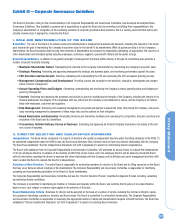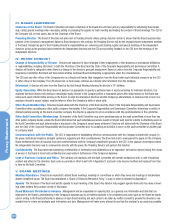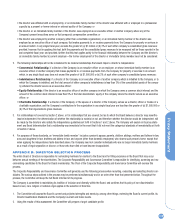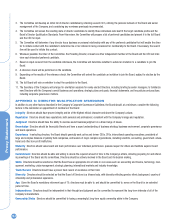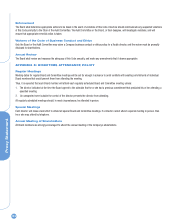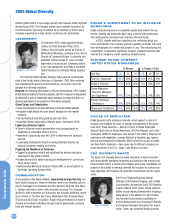Kodak 2003 Annual Report Download - page 135
Download and view the complete annual report
Please find page 135 of the 2003 Kodak annual report below. You can navigate through the pages in the report by either clicking on the pages listed below, or by using the keyword search tool below to find specific information within the annual report.
Proxy Statement
135
APPENDIX D: DIRECTORS’ CODE OF CONDUCT
The Board of Directors of Eastman Kodak Company has adopted this Directors’ Code of Conduct to guide the directors in recognizing and addressing
ethical issues and in ensuring that their activities are consistent with the Company’s values of:
• Respect for the dignity of the individual,
• Uncompromising integrity,
• Trust,
• Credibility,
• Continuous improvement and personal renewal, and
• Recognition and celebration
The Code is intended as a source of guiding principles, since no code or policy can anticipate every situation that may arise. Directors with questions
about the Code’s application to particular circumstances are encouraged to discuss the issue with the Company’s Compliance Officer or with the Chair of
the Audit Committee of the Board of Directors.
Compliance with Laws and Company Policies
Directors are expected to comply with applicable laws and Company policies, and to monitor legal and ethical compliance by the Company’s officers and
other employees.
Conflicts of Interest
Directors must avoid any conflicts of interest with the Company. A “conflict of interest” exists when a director’s personal or professional interest is
adverse to, or may appear to be adverse to, the interests of the Company. Conflicts of interest may also arise when a director, or members of his or her
family, or an organization with which the director is affiliated, receives improper benefits as a result of the director’s position. Any situation that involves,
or may involve, a conflict of interest must be promptly disclosed to the Company’s Compliance Officer or the Chair of the Audit Committee.
Corporate Opportunities
Directors owe a duty to the Company to advance its legitimate interests. Directors may not take for themselves personally or for other organizations with
which they are affiliated opportunities discovered through the use of Company property, information or position. No director may compete with the
Company or use Company property, information or position for improper personal gain.
Competition and Fair Dealing
Directors shall endeavor to deal fairly with the Company’s customers, suppliers, competitors and employees, and shall oversee fair business dealing by
the Company’s officers and employees. No director should take unfair business advantage of anyone through manipulation, concealment, abuse of privi-
leged information, misrepresentation of material facts or any other intentional unfair dealing.
The purpose of business entertainment and gifts in a commercial setting is to create goodwill and sound working relationships, not to gain unfair advan-
tage with customers. Directors and members of their immediate families may not accept gifts from outside persons or entities when the gifts are made
in order to influence the director’s action as a member of the Board, or where acceptance of the gifts could create the appearance of impropriety.
Confidentiality
Directors must maintain the confidentiality of information entrusted to them by the Company or its customers, and any other information which comes to
them about the Company, except when disclosure is authorized or legally required. Confidential information includes all non-public information that might
be of use to competitors, or harmful to the Company if disclosed.
Protection and Proper Use of Company Assets
Directors must protect the Company’s assets and ensure their efficient use. Directors must not use Company time, employees, supplies, equipment,
buildings or other assets for personal benefit, unless the use is approved in advance by the Chair of the Audit Committee or is part of a compensation or
expense reimbursement program available to all directors.
Encouraging the Reporting of Any Illegal or Unethical Behavior
Directors should promote ethical behavior and take steps to ensure that the Company (a) encourages employees to talk to supervisors, managers and
other appropriate personnel when in doubt about the best course of action in a particular situation; (b) encourages employees to report violations of
laws, rules, regulations or the Company’s Business Conduct Guide; and (c) informs employees that the Company will not permit retaliation for reports
made in good faith.


